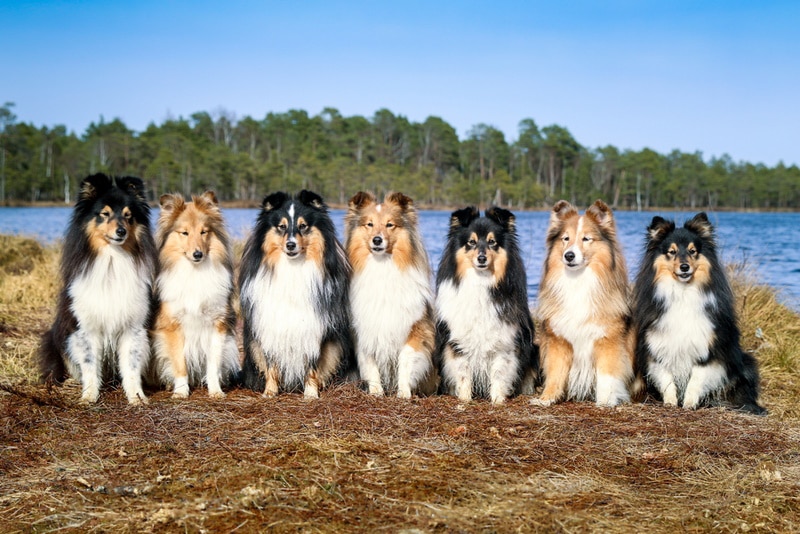Boston Terrier vs. French Bulldog: What’s the Difference?

Updated on

Boston Terriers and French Bulldogs are commonly confused for one another, and it’s easy to see why: both have very short snouts, docked tails, and bug eyes, and weigh about 20–30 pounds.
However, there are some areas in which the two breeds differ. Those distinctions could make all the difference in the world if you’re looking to adopt one or the other.
Visual Differences
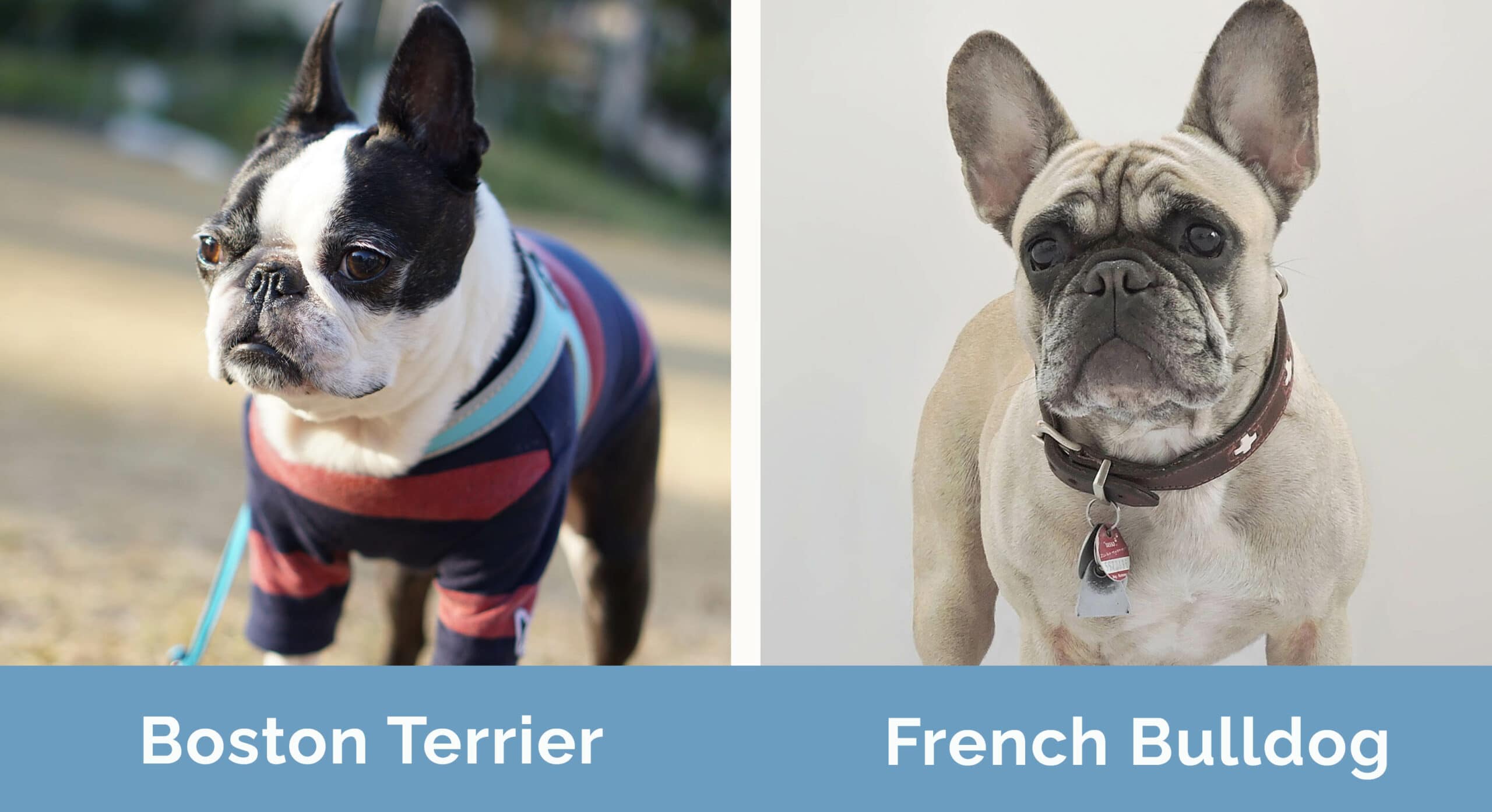
You’ve probably noticed that Boston Terriers and French Bulldogs look pretty similar. They’re both small, muscular dogs with wrinkled snouts and perky ears. Boston Terriers are slightly taller and have longer legs, while French Bulldogs are somewhat stockier. One of the biggest differences between these dogs is their ears — Boston Terriers have pointed ears, while French Bulldogs have big, rounded ears that look a little like bats.
At a Glance – Boston Terrier vs. French Bulldog
Let’s look at the key points of each breed.
- Average Height (adult): 15–17 inches
- Average Weight (adult): 12–25 pounds
- Lifespan: 11–13 years
- Exercise: Daily, 1 hour
- Grooming needs: Medium
- Family-friendly: Yes
- Dog-friendly: Often
- Trainability: Very good
- Average Height (adult): 11–12 inches
- Average Weight (adult): 16–24 pounds
- Lifespan: 9v11 years
- Exercise: Daily, 1 hour
- Grooming needs: Medium
- Family-friendly: Yes
- Dog-friendly: Often
- Trainability: Good
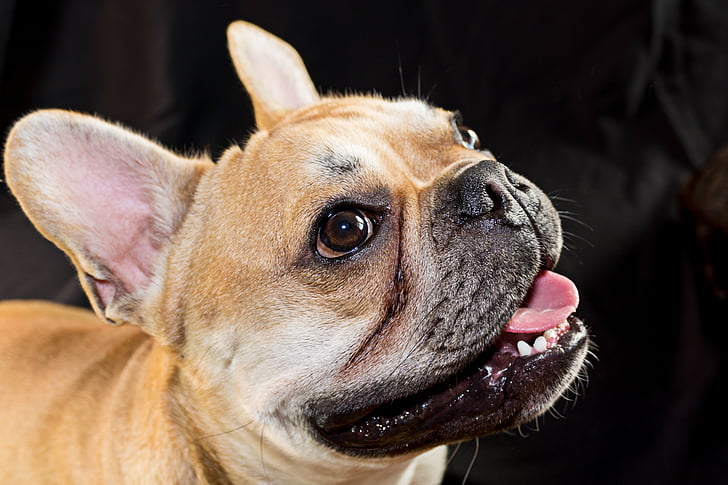
Appearance
As mentioned above, the two breeds share a lot of physical characteristics, including having a similar build.
Frenchies tend to be shorter and stockier, though, and often weigh a few pounds more (they’re Bulldogs, after all). Generally, their heads are more square and have a boxy appearance, and they have large ears with rounded tips.
Bostons, on the other hand, are longer and leaner (up to a point, of course). Their heads are rounder, and their ears are pointier.
French Bulldogs come in a wide variety of color patterns, with brindle, white, and fawn being three of the most common. While Bostons can be found with different markings, they’re most famous for having a black and white tuxedo pattern.
Health
Both Boston Terriers and French Bulldogs have short, stubby noses — a condition known as being “brachycephalic.” While this makes them adorable, it also limits how much air they can take in, and often leads to respiratory issues.
The two breeds are also prone to a variety of eye issues, as well as joint and spinal conditions. They’re somewhat likely to develop cancer later in life too, so regular checkups are a must.
You have to be careful how much you feed them, as both breeds find it easy to pack on the pounds. This is especially troublesome given the fact that their short noses make it difficult for them to exercise.
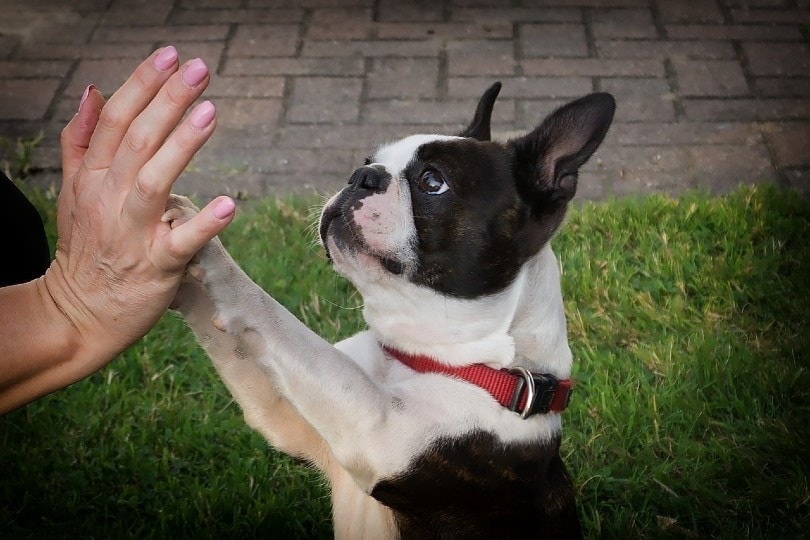
Grooming
Neither dog has a long coat, and brushing is minimal. You shouldn’t have to put up with much shedding from either animal.
One thing you do need to be aware of is the necessity of keeping their skin folds clean, especially around their faces. If you don’t, bacteria can build up and cause an infection.
Smells aren’t much of an issue with either dog (except for flatulence — and whoo boy is it an issue with both). As a result, you shouldn’t need to bathe either one more than a couple of times a year, unless they get dirty.
Temperament
While neither breed is likely to win the Iditarod anytime soon, Frenchies tend to be even more low-energy than Bostons. That said, energy levels can vary wildly from Boston to Boston, and one may only need a short walk every day while another requires lots of playtime.
Regardless, both should thrive in an apartment and obviously, both do well living in houses with large yards. These pooches can handle just about any living situation, provided they’re kept indoors.
Frenchies tend to be the more stubborn of the two breeds (again, they’re Bulldogs), so training them will require a little more time and dedication. Bostons are usually eager to please, so as long as you’re clear and consistent with your commands, you should find that training them is fairly straightforward.
Both breeds get along well with humans and other animals, but they both also have a bit of a jealous streak. If it’s just been you and your pup for a while, you’ll need to introduce them to new people gradually.
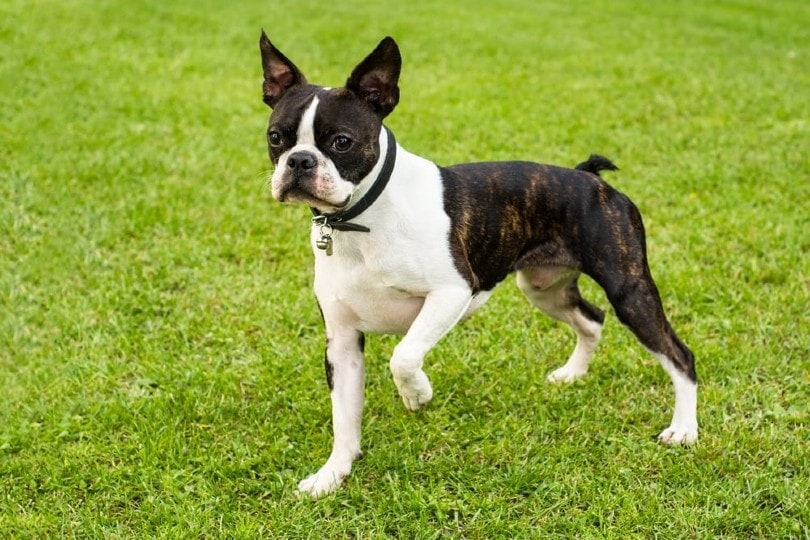
Boston Terrier vs. French Bulldog – Which One Should You Adopt?
While this article was dedicated to the differences between the two breeds, the fact is that they’re still remarkably similar, and you can’t go wrong adopting either one. If you’ve previously owned a Frenchie, you should handle life with a Boston quite well, and vice versa.
That being said, Boston Terriers are a little easier to train, so they might be the better choice for first-time owners. The trade-off is that you might have to deal with slightly higher energy levels as a result.
So when it comes to Boston Terriers vs. French Bulldogs, regardless of which one you ultimately decide on, you’ll end up with a fun, goofy, loyal companion that will follow you to the ends of the Earth — or at least to the end of the block. That’s about as far as they can get with those noses.
See also:
- Why Do Boston Terriers Fart So Much? 5 Common Reasons
- 14 Different Types of French Bulldogs: Guide (With Pictures)
Featured Image Credit to: (L) BIGANDT.COM, Shutterstock | (R) Alexandru Sofronie, Shutterstock


